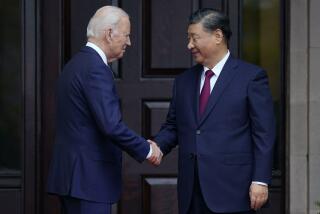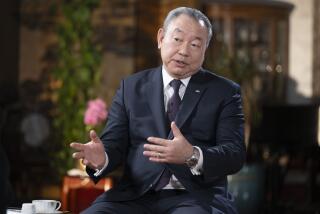Chinese Reject Taiwan Trade Overtures
The Chinese government moved Wednesday to dampen the hopes of Taiwanese President-elect Chen Shui-bian and his supporters for an early relaxation of trade and transportation restrictions across the Taiwan Strait.
Chen, who was elected earlier this month, said during his campaign and in subsequent interviews that he would like to open up what are commonly called the “three links” between Taiwan and China: direct trade, shipping and postal services.
At the moment, trade between China and Taiwan must be carried out indirectly, generally through Hong Kong. Taiwan’s business executives have been especially eager for an opening of direct trade with the mainland, which would lower their costs and simplify their logistics.
But a senior Chinese diplomat asserted Wednesday that before trade restrictions can be eased, Chen must first promise to adhere to the principle that there is only “one China”--a commitment Chen has repeatedly been unwilling to make.
The Beijing government considers Taiwan to be part of its own sovereign territory.
“I do not see that there will be [direct trade] between the two sides without an endorsement by Chen Shui-bian of the ‘one China’ principle,” said Liu Xiaoming, deputy chief of mission at the Chinese Embassy in Washington. “The ‘one China’ principle is the basis for cross-strait relations, including the three links.”
Liu’s remarks were echoed Wednesday by a leading Chinese scholar. At a Washington conference on Taiwan, Huang Renwei of the Shanghai Academy of Social Sciences said it is unlikely that Beijing could or would open up for direct trade without prior acceptance of the “one China” policy by the new government in Taipei.
“It would be hard . . . almost impossible,” Huang told the group.
The two statements appear to demonstrate China’s emerging approach toward Chen--a policy aimed at seeking new commitments from him and also at probing exactly what he may be willing to do and say to improve Taiwan’s relations with China.
Chen, who takes office in May, will be the first president of Taiwan from the Democratic Progressive Party, which for years advocated independence for the island.
During his campaign, Chen sought to moderate his party’s long-standing position by saying he would be willing to discuss with Chinese leaders the idea of “one China.”
“We do not exclude any possibility,” he told The Times in January. “For example, what exactly does ‘one China’ mean? What’s its content? And what are the benefits of ‘one China’ for the Taiwanese people?”
But Chen has never said he would make a commitment to the “one China” concept, and that is what China now is requiring before direct trade can be established.
Chen’s party has strong ties to Taiwan’s business community. On March 21, only three days after the presidential election, Taiwan’s parliament approved legislation opening the way for direct trade and transportation between the Chinese mainland and nearby islands belonging to Taiwan.
That was a mostly symbolic measure, because little of Taiwan’s trade with the mainland comes from these small islands. But that legislation, together with Chen’s election, suggested that momentum might be building for a broader opening of direct trade across the Taiwan Strait.
One of the unresolved issues between China and Taiwan is whether there is a “one China” formula vague enough so that both governments can agree to it.
Taiwanese officials have said they might be able to envision a formula in which there is one “China” but two states or governments under it, in a relationship comparable, say, to Australia and Canada under the British Commonwealth. Beijing counters that such a formula would amount to “two Chinas.”
Huang, the scholar, suggested Wednesday that it would be counterproductive for the new government in Taiwan to press for a more precise definition of “one China.”
“There are those who want a clear definition,” he said, “but this will make it much harder to resolve the problem” of launching a substantive dialogue between Taipei and Beijing.
More to Read
Start your day right
Sign up for Essential California for news, features and recommendations from the L.A. Times and beyond in your inbox six days a week.
You may occasionally receive promotional content from the Los Angeles Times.






